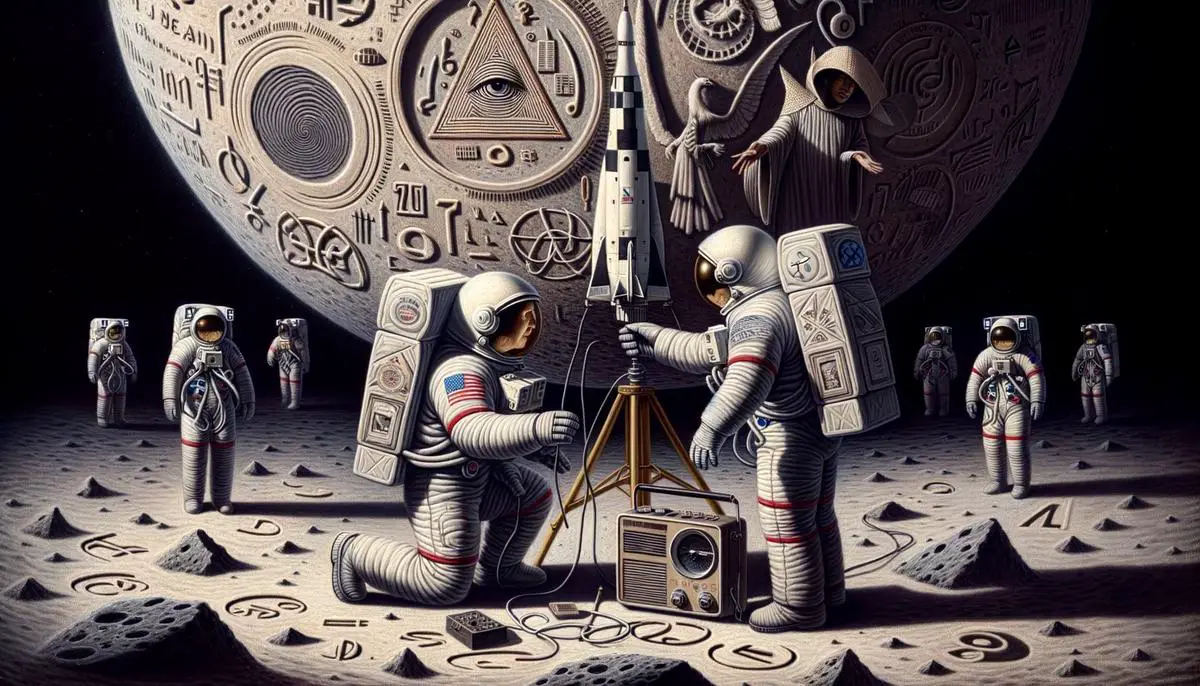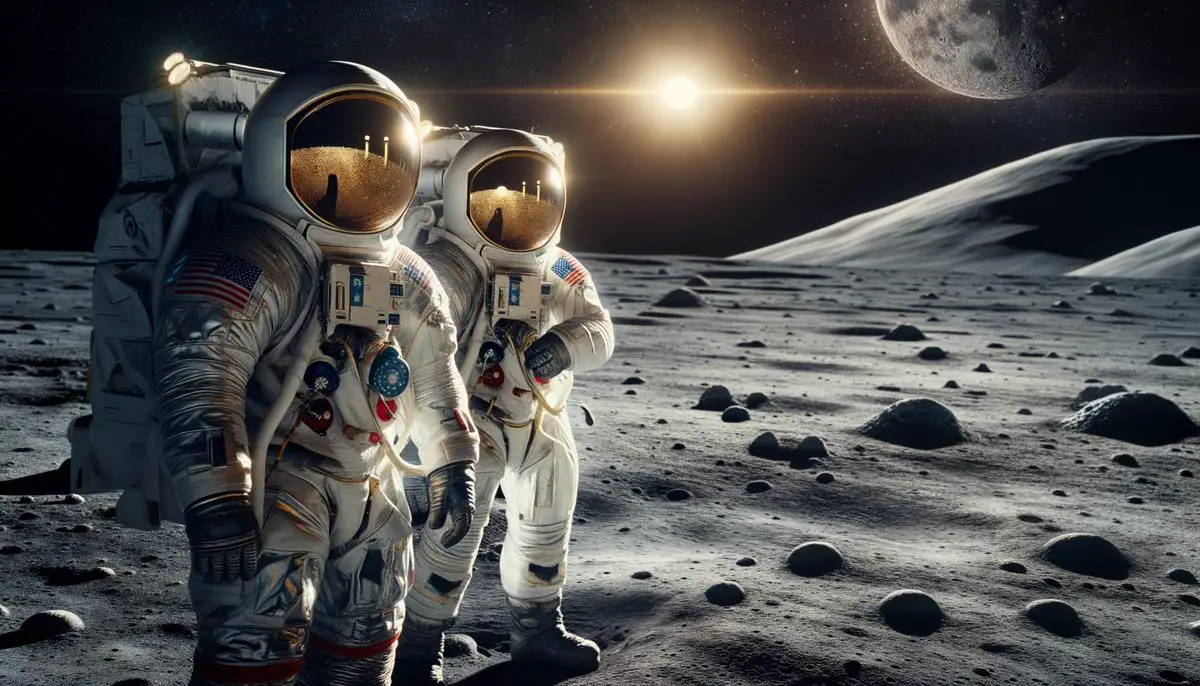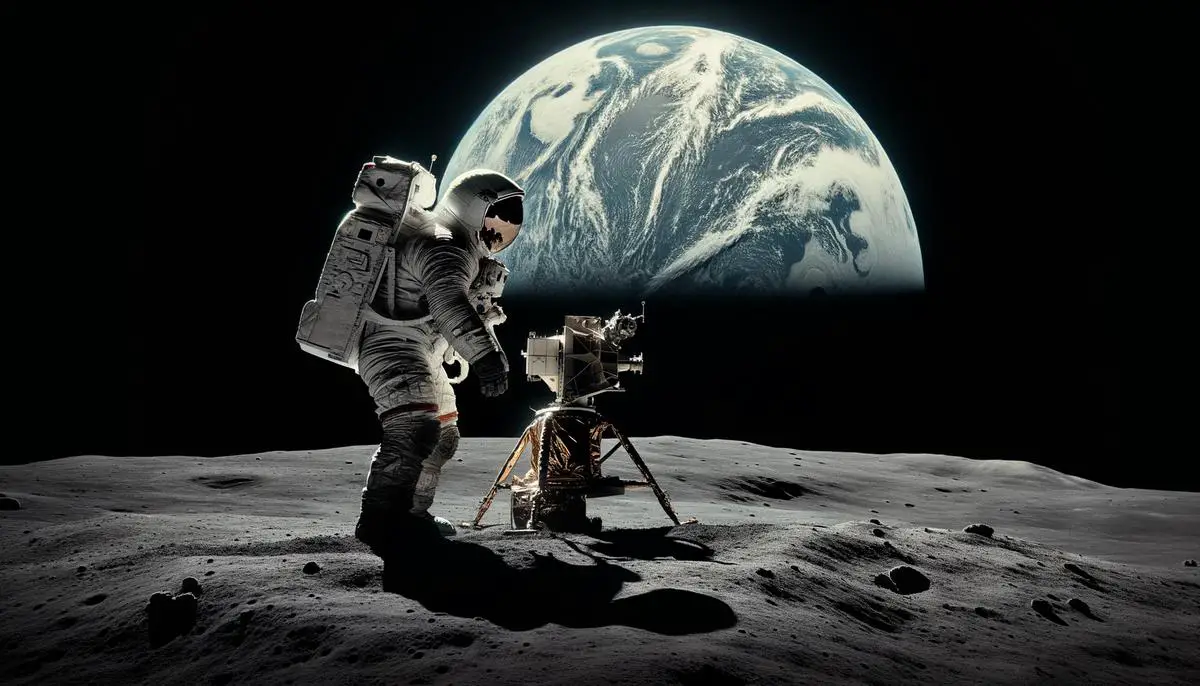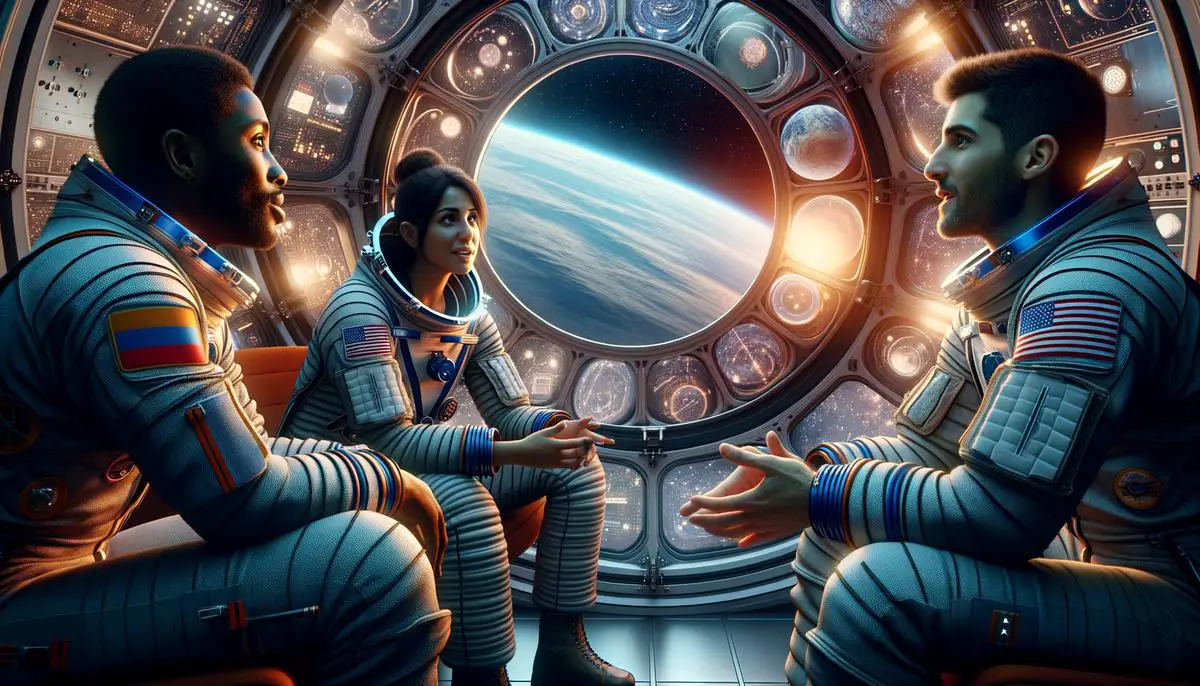Ever stop to think about what life is like after an astronaut comes back to Earth from space? Going from zero gravity to our planet’s pull can be a big change. Astronauts experience this shift in unique ways, bringing back with them habits and viewpoints that might seem a bit out of the ordinary. We’re going to look at how their time in space influences the way they live, think, and see the world once they’re back on solid ground.
Contents
- 1 Unusual Post-Mission Behaviors
- 2 Public Statements and Conspiracy Theories
- 3 Shifts in Career Paths
- 4 Advocacy for Space Exploration and Environmental Awareness
- 4.1 Bridging the Vastness of Space and the Delicacy of Earth
- 4.2 The Apollo Legacy: A Catalyst for Conservation Initiatives
- 4.3 Space Exploration: A Beacon for Technology and Sustainability
- 4.4 Education and Outreach: Igniting the Next Generation’s Passion
- 4.5 Final Thoughts: From Lunar Landscapes to Lush Earth
- 5 Personal Reflections and Lessons Learned
Unusual Post-Mission Behaviors
Living the Astronaut Life Back on Earth: A Peek Into Their Spacey Habits
Have you ever wondered what it’s like to readjust to life on Earth after floating in the zero-gravity wonders of space? Astronauts, those stellar explorers who venture into the great unknown, come back with more than just incredible stories and breathtaking photos. They often return with some pretty odd habits too! Let’s dive into the quirky behaviors astronauts have developed after their out-of-this-world experiences.
- Missing the Mid-Air Catch
- The Phantom Helmet Tap
- Sleeping Upright? No Problem!
- The Space Walk Shuffle
- The Disappearing Sense of Taste
- The Constant Clean-Up
Imagine you’re chilling in space, where everything floats. Need to hand something to a fellow astronaut? Just give it a gentle push, and it floats right over. Back on Earth, gravity isn’t so forgiving. Many astronauts have caught themselves absentmindedly letting go of objects, expecting them to hover mid-air. Spoiler alert: everything clatters right down to the floor. Talk about a hard habit to break!
In space, communication is key, and since everyone’s floating around in their helmets, astronauts get used to tapping on their headgear to adjust microphones, scratch an itch, or just refocus. Back on Earth, it’s not uncommon to see an astronaut reaching to tap the side of their head as if wearing their space helmet, only to remember they’re in the gravity-bound real world. It’s like a space version of phantom phone vibration!
After spending months in space sleeping tethered to a wall, in a bag, or floating, lying flat on a bed doesn’t feel quite right. Astronauts get so accustomed to the freedom of sleeping in zero gravity that the Earth’s pull feels extra heavy. Some have even taken to sleeping in more upright positions once they’re back, finding the adjustment to traditional horizontal sleeping a tad awkward.
Walking isn’t the same when you’ve adapted to floating through space. Astronauts often find themselves doing a sort of shuffle once they return, relearning how to use their legs under the weight of gravity. Their bodies have to recalibrate balance and movement, making their first steps back on Earth look like a dance between tripping and gliding. It’s a unique shuffle you won’t find on any dance floor!
Okay, this might not be a habit, but it’s a bizarre change! In space, fluids in your body distribute differently, often leading to a stuffed-nose feeling. This can dull taste buds, leading astronauts to crave much spicier food than usual. Upon return, their sense of taste gradually returns to normal, but don’t be surprised if an astronaut keeps reaching for that hot sauce long after their space journey.
In space, cleanliness is next to, well, essential. Crumbs and tiny objects can float into equipment and cause havoc. Astronauts become masters of cleanliness, a habit that sticks with them back on Earth. Don’t be astonished to find an astronaut compulsively tidying up – those space habits of capturing every floating speck can carry over into an unstoppable cleaning frenzy at home.
From the surprising to the downright practical, these astronaut habits give us a tiny glimpse into the profound ways space travel can alter daily life. Adjusting back to Earth’s rules isn’t easy, but it sure makes for some interesting stories! Whether it’s the mid-air catch fail or the space walk shuffle, astronauts’ space-induced quirks highlight just how transformative a journey to the stars can be.

Public Statements and Conspiracy Theories
Why Apollo Astronauts Dabble with Space Conspiracies
The Apollo missions stand as monumental achievements in human history, taking us to the moon and back. But amongst the stories of triumph and technological feats, a curious narrative unfolds: some Apollo astronauts have been tied to controversial statements or have shown support for space-related conspiracy theories. What’s up with that?
First off, let’s consider the sheer uniqueness of their experiences. Imagine being one of only a handful of people who’ve actually set foot on the moon. This kind of singular adventure can profoundly affect a person’s worldview. Upon returning, some astronauts found the routine of Earth a little less… exciting, and others struggled to convey the enormity of their experiences. The disconnect could, in some, foster a tendency to question mainstream narratives or explore unconventional ideas.
Then there’s the spotlight effect. Being an Apollo astronaut makes you a global figure, and let’s face it, controversy tends to get more attention than conformity. For some, making surprising or unconventional statements might have been a way to remain relevant in public discourse, or perhaps a method to encourage critical thinking and skepticism about information we often take for granted.
It’s also worth mentioning the impact of post-mission life. After accomplishing what many would consider the pinnacle of their career and life’s work, what comes next? This existential quandary led some to seek new meanings and truths, occasionally leading them into territories that many would consider outside the scientific consensus.
Moreover, an astronaut’s scientific curiosity does not wane upon returning to Earth. This innate drive to explore and discover could naturally extend to questioning established narratives, including those about space. Their technical background gives them a unique perspective, and when they speak, people listen. However, this influence can sometimes blur the lines between informed skepticism and endorsing unverified claims.
Lastly, we’ve got to consider the era these missions occurred. The Cold War backdrop, filled with propaganda and mistrust, could have seeded doubts or fostered a disposition towards questioning governmental narratives, including those related to space exploration.
In wrapping things up, while the claims and theories supported by some Apollo astronauts may raise eyebrows, they’re rooted in a complex web of personal experience, the aftermath of unparalleled achievements, and the human drive to question and seek truth. Understanding their perspectives requires peeling back the layers of not just their space journeys, but their life journeys too.

Shifts in Career Paths
Ever ponder on what life looked like for Apollo astronauts once they hung up their space suits and settled back on Earth? Going from taking giant leaps on the moon to the regular strolls on our home planet must have sparked some astonishing shifts in their career paths post-NASA. With their stellar achievements literally out of this world, let’s zoom into how these experiences sculpted their next endeavors.
- From Space Exploration to Exploring New Career Realms Apollo astronauts, having witnessed the vast universe from a perspective few will ever experience, returned with a hunger for further exploration – but this time on Earth. Their innate drive to discover and push boundaries didn’t just evaporate; instead, it transitioned into various sectors. Some astronauts became business moguls, channeling their problem-solving skills into successful ventures. Imagine going from calculating orbital trajectories to strategizing market expansions!
- Shooting for the Stars to Educating Stars of Tomorrow After hanging up their space helmets, a number of Apollo alumni turned to education. Their mission? To cultivate a new generation of explorers, scientists, and engineers. Their firsthand tales from the cosmos not only enriched the curriculum but also served as a beacon of inspiration for students. Picture a former moonwalker as your science teacher – that’s one small step for education, one giant leap for student motivation!
- Political Orbits Believe it or not, some of our celestial explorers traded lunar landscapes for the political arena. With their unprecedented experiences, these astronaut-turned-politicians brought unique perspectives to the table. Their advocacy for science, education, and space exploration investments placed these critical areas into the spotlight. It’s no small feat transitioning from space missions to crafting legislation that could shape the future of space exploration.
- Artistic Ventures Beyond Earthly Limits Here’s a fascinating twist: A few of the Apollo astronauts channeled their cosmic journeys into art. Translating their out-of-this-world views onto canvas, these intrepid explorers shared a side of the universe that mere photographs or words could scarcely capture. Their artwork not only serves as a historical snapshot but also as a profound source of inspiration, blending science and art in a stellar symphony.
- Environmental and Humanitarian Eclipses Witnessing Earth from space, floating in a sea of stars, profoundly impacted these astronauts, emboldening some to become vocal environmentalists and humanitarians. Their unique perspective of seeing our planet as a fragile, interconnected ecosystem inspired them to advocate for its protection. From championing climate action to water conservation, these former space travelers remind us of our shared responsibility to safeguard our pale blue dot.
- Continuing to Push the Final Frontier And let’s not forget those who remained anchored in the realm of space and science. A number of Apollo alumni continued contributing to aerospace, whether through advising NASA, collaborating with space agencies, or spearheading initiatives to cultivate the next era of space exploration. Their irreplaceable experience and wisdom have been imperative in shaping policies, inspiring projects, and mentoring the new vanguard of astronauts.
The gravitational pull of their Apollo missions forever altered the trajectories of these astronauts’ lives, steering them into diverse but equally impactful orbits. Whether through sparking innovations in business, enlightening young minds, navigating the political spectrum, painting the cosmos, advocating for our planet, or paving the way for future explorations, the legacy of their lunar footsteps transcends their NASA tenure. Their post-moon landing careers are a testament to the indelible mark of their lunar experiences, propelling them – and us – into new frontiers beyond the stars.

Advocacy for Space Exploration and Environmental Awareness
Apollo astronauts, those daring pioneers of space exploration, have played a monumental role in not only pushing the boundaries of what’s possible but also in charting a course toward a deeper understanding of our planet and the need to preserve its beauty. Their unique experiences, coupled with their credibility, have allowed them to become influential advocates for both space exploration and environmental conservation. Let’s dive into the incredible ways these space voyagers have helped in promoting these crucial areas.
Bridging the Vastness of Space and the Delicacy of Earth
One might wonder, how do journeys to the cold, vast expanse of space translate to a fervent plea for Earth’s conservation? The answer lies in a phenomenon astronauts experience, known as the “Overview Effect.” This cognitive shift in awareness happens when you see Earth from space—vibrant, fragile, and just hanging there in the void. Apollo astronauts, upon witnessing this awe-inspiring sight, have eloquently shared their experiences, awakening a collective awareness about the interconnectedness of all life and the fragility of our planet. Their stories and speeches have inspired movements and discussions around the globe focusing on protecting our tiny blue dot from environmental degradation.
The Apollo Legacy: A Catalyst for Conservation Initiatives
Their influence didn’t stop at just words. Some astronauts have taken more concrete steps toward environmental advocacy. Take, for instance, their campaigns against climate change and habitat destruction. By leveraging their platforms, they have successfully brought urgent environmental issues to the forefront of public consciousness, driving home the message that the Earth needs to be viewed not as a resource to be exploited but as a home to be cherished and protected. Their involvement in projects and collaborations with environmental groups has amplified the call for action, leading to tangible conservation efforts.
Space Exploration: A Beacon for Technology and Sustainability
Furthermore, the Apollo astronauts have championed the cause of space exploration as a means to advance technologies that benefit Earth’s environment. They argue that the technology developed for space missions can also address Earth’s ecological challenges. From innovations in solar energy derived from spacecraft design to advancements in water-recycling systems onboard the International Space Station, the technology transfer between space exploration and Earth’s sustainability solutions has been significant. The astronauts’ advocacy underscores the notion that space exploration and environmental conservation are not mutually exclusive but are complementary endeavors that can fuel each other’s success.
Education and Outreach: Igniting the Next Generation’s Passion
Astronauts have also played a pivotal role in education, using their experiences and platforms to ignite a passion for science, space, and sustainability among the younger generations. Through visits to schools, participation in documentaries, and involvement in science and environmental programs, they have become role models advocating for a curious, observant, and environmentally conscious approach to life. Their stories and lessons encourage aspiring scientists, engineers, and environmentalists to dream big and contribute positively to our world and beyond.
Final Thoughts: From Lunar Landscapes to Lush Earth
In essence, the Apollo astronauts, through their unparalleled experiences and esteemed voices, have significantly contributed to promoting space exploration and environmental conservation. They’ve shown us that looking outward to the stars can teach us about caring for our home, fostering a culture of sustainability driven by technological innovation and a deep-seated appreciation for our planet. Their legacy is a reminder of the power of human curiosity and the potential to harness it for the good of Earth and the future of humanity in the cosmos. As we continue to gaze at the stars, let’s remember the lessons learned from those who ventured there first, using their insights to guide our stewardship of Earth.

Personal Reflections and Lessons Learned
Journey Beyond the Blue: Apollo Astronauts’ Glimpse Into Their Souls
Ever wondered what it’s like to gaze upon the Earth from the vast, star-studded expanse of space? Apollo astronauts, those trailblazers who first ventured to the moon, have shared insights that go beyond mere scientific discovery. Their journeys have imparted life lessons and personal revelations that resonate deeply with those of us grounded on Earth.
Embracing Vulnerability in the Vastness of SpaceOne standout insight comes from the stark vulnerability felt in the cold, unforgiving vacuum of space. Astronauts recount moments of profound isolation, encased in a spacecraft or a space suit, with only a thin barrier separating them from the vastness of the universe. This palpable sense of vulnerability brings into sharp focus the fragility of human life. It’s a humbling experience that shapes astronauts’ perspectives, making them more appreciative of the delicate web of life on our own planet.
The Unseen Bonds of HumanityDespite—or perhaps because of—this isolation, astronauts experience a strengthened sense of connection to humanity. Gazing at the Earth, with its swirling clouds and radiant blue oceans, the conflicts that divide people fade, replaced by an overwhelming empathy and a desire for peace and unity. This “Orbital Perspective” fosters a sense of global citizenship, a reminder that we share a common destiny on our journey through the cosmos.
Cherishing Earth: A Renewed CommitmentArmed with this unique perspective, many Apollo astronauts turn their attention toward Earth, becoming vocal advocates for environmental preservation. The profound contrast between the vibrant life on Earth and the barren lunar landscape underscores the necessity of safeguarding our planet’s ecosystems. Initiatives aimed at combating climate change, promoting sustainable technologies, and preserving natural habitats gain passionate supporters among the astronaut community.
The Magic of Stellar ReflectionsThe introspective journey doesn’t end with environmental advocacy. Astronauts frequently speak of their space missions as catalysts for personal growth. The intense preparation, the risks involved, and the sheer awe of the experience prompt deep reflection on one’s values, goals, and the overall purpose of life. This celestial introspection often leads to significant career shifts, with astronauts pursuing paths in education, art, and public service, aiming to share their transformative experiences and inspire others.
Navigating Life with Lunar WisdomPerhaps the most poignant lessons from Apollo astronauts center around perseverance and adaptability. The rigorous training, the meticulous planning for each mission, and the swift responses required when faced with the unexpected in space teach invaluable lessons in resilience. Astronauts learn to face challenges head-on, adapt to evolving situations, and maintain a calm, problem-solving attitude—traits that serve them well long after their space-faring days are over.
Leaving a Legacy of Exploration and HopeThe stories of Apollo astronauts go far beyond tales of technological triumphs and lunar explorations. They are narratives imbued with personal growth, introspection, and a renewed commitment to collective human progress. By sharing their unique perspectives, these explorers of the heavens encourage us to view our planet with fresh eyes, to cherish and protect our shared home, and to approach life’s challenges with courage and a sense of wonder. Through their experiences, we’re reminded that the most remarkable journeys are not just those that take us outward, but those that bring us inward, sparking a profound exploration of our place in the universe.

The stories and insights from astronauts who have walked among the stars offer us more than just tidbits about living in space; they provide a mirror reflecting our own world in a new light. Through their eyes, we are reminded of the boundless wonders beyond our atmosphere and the preciousness of our home planet. Their experiences encourage us to appreciate our Earth, to protect its beauty, and to never stop reaching for the stars, armed with curiosity and a drive to discover. It’s a compelling reminder that the greatest explorations often lead to discoveries not just about the universe, but also about ourselves.
